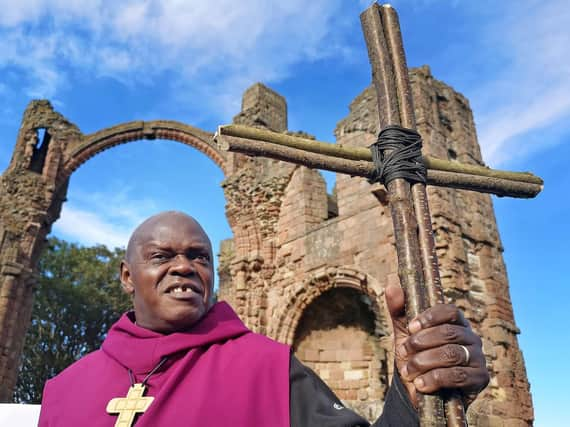Scots are not impressed by Britain's chumocracy - Lesley Riddoch


It was revealed this weekend that Britain’s first black archbishop John Sentamu has been ‘snubbed’ by Number Ten and left off the latest Honours List – unlike his white Anglican predecessors and contemporaries. A life peerage would have let the 71-year-old remain in the House of Lords after retiring in June when he stopped being one of the 26 Church of England bishops who sit as ‘lords spiritual’.
Thus, grievously, he will not get to rub shoulders with those deemed more worthy of advancement - Ian Botham, Claire Fox, and Boris’ brother.
Advertisement
Hide AdAdvertisement
Hide AdLooked at one way, Sentamu’s exclusion is an astonishingly clumsy red card - even more baffling and counter-productive given the changed political climate created by the Black Lives Matter campaign. Looked at another way, it’s baffling that a human rights activist beaten up by Idi Amin’s thugs in his native Uganda and unwilling to wear a dog collar in protest at Mugabe’s crimes in Zimbabwe, could even countenance a seat in the House of Lords. Might Sentamu not strike a real blow for democracy by refusing to accept life membership of the world's second largest unelected chamber, and siding instead with the Kirks of Scotland, Ireland and Wales who opted to decline such worldly temptations centuries back?
Somehow, that’s unlikely.
British civic figures and poltical parties feel compelled to use the second chamber or lose its (questionable) influence. The only major party that refuses to nominate candidates is the SNP. Indeed, last month, one of its MPs Patricia Gibson, petitioned the Commons to abolish the Lords because it’s one of only two sovereign states that still reserves parliamentary seats for religious representatives. The other is Iran.
Despite 70 per cent support across the UK and 80 per cent in Scotland - the abolition petition failed.
How can the main parties remain so unashamedly thirled to feudal hierarchies?
Only one person thinks the SNP should reverse its position and embrace the ermine.
Recently, Lord Kerr of Kinlochard said the SNP’s absence from the Lords limited their ability to stem Boris Johnson’s assault on devolution. Fair enough. But this Prime Minister is prepared to break international law, sack his own MPs and suspend parliament completely. Does he actually hear a single syllable uttered by their Ladies and Lordships, or just rely on their compliance to keep disbelief suspended and the whole broken system of British governance afloat?
Scottish public attitudes are consistently hostile to cronyism, the power of ‘nobility’ and the way such unashamed elitism marks Britain as an archaic, backward- facing country - not just producing TV hits like Upstairs Downstairs and Downton Abbey but living with their feudal attitudes too.
All of this subtly and constantly undermines the PM’s claim that we’re in this together. It’s noticeable that network news bulletins featuring English health experts, business leaders, quango bosses and even city mayors are rapidly replete with Sirs, Lords, Barons and Ladies. Every viewing hour quietly confirms that Britain is now the biggest chumocracy in the West.
Folk notice.
Especially in the land o’ Jock Tamson’s bairns.
Advertisement
Hide AdAdvertisement
Hide AdIt’s not cool to be knighted in Scotland – ask Baroness Davidson. Or should we still turn a blind eye to that inconvenient truth?
‘Clever toffs’ don’t enjoy positions of real prominence in Scottish public life – Boris’ new Advocate General excepted – and his new life peerage won’t make Keith Jackson’s support for a law-breaking government any less shameful.
Now though it’s apparent that the SNP’s unwillingness to play the ‘ennobling’ game is reaping real rewards. Scotland’s Covid experts have the great advantage of a natural delivery that arises from equal status. Ordinary speech and weel kent turns of phrase, help the great and good gain respect, unravel science and coax consent far better than pompous instructions handed down from on high.
Much has been written about the way Covid communication has fuelled the steady rise in support for independence. But the impact of being ‘telt’ by our equals goes beyond mere words. It’s a daily demonstration of Scotland’s capacity for authentic self-government.
Now of course, that’s easy to overstate. Scotland is still so enmeshed in the UK that we’re about to be hauled from the EU, see key powers over state support and eco-standards removed to Westminster, exit furlough too soon and fail to get the borrowing powers of the average local council.
But devolved nations control public health, and as Wales has been first to demonstrate, that can also mean control of borders. Indeed, Wales may yet lead a hesitant England back into step on a ‘four- nation’ circuit-breaker.
It’s called self-government.
The slowly-building perception of distance from Westminster on civil matters like the ever-expanding Lords, has accelerated with the public health and economic crisis of Covid and will deepen further with the imminent trade disaster of Brexit. You don’t have to be a lifelong independence supporter to feel we’re inhabiting two (sometimes three) divergent political states on the island of Great Britain.
As the Bard said; “The rank is but the guinea stamp,
The man’s the gowd for a’ that.”
Turning that cultural belief into a governance system is no small feat. It helps demonstrate that Scotland is increasingly standing alone, with her own modern, egalitarian standards, and not those of a rudderless and status-obsessed Mother Ship.
Comments
Want to join the conversation? Please or to comment on this article.